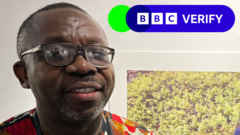Dr. Leo Igwe is emerging as a pivotal figure in the fight against witchcraft accusations in Nigeria, a phenomenon that can devastate lives and has even led to lynchings. “I could no longer stay idle and witness the random killings,” Dr. Igwe shared in an interview. Following his doctoral studies in religious studies, he felt an urgent need to take proactive measures against this brutal practice that perpetuates fear and violence, particularly in vulnerable communities.
The rise of Pentecostal pastors in Nigeria has been linked to a troubling trend of targeted witch hunts. Dr. Igwe’s organization, Advocacy For Alleged Witches, aims to utilize compassion and evidence-based approaches to protect those wrongfully accused. The group’s efforts extend across several African nations, including Ghana and Malawi.
One instance involved Jude, a glazier in Benue State, who was wrongly accused of witchcraft after he commented on a boy’s agility. This led to a violent mob attacking him, with serious consequences for his personal and professional life, including losing his job due to the stigma associated with the accusation. Dr. Igwe and his team intervened, providing medical assistance, social rehabilitation, and even covering Jude's university fees to help him rebuild his life.
Belief in witchcraft is widespread in Nigeria, often attributed to socio-economic issues like poverty or illness. Victims of such superstition are frequently the elderly, children, or those with disabilities. Dr. Olaleye Kayode, an academic in African Indigenous Religions, attributes the perpetuation of these beliefs to both traditional practices and certain religious doctrines that propagate harmful narratives.
Throughout Dr. Igwe's activism, he has faced physical violence and threats towards his family, but he remains committed to his cause. He emphasizes the need to distinguish superstition from cultural identity, advocating for the protection of human rights against these accusations. Although Nigerian law acknowledges witchcraft accusations as an offense, enforcement is often lacking.
In 2021, the UN Human Rights Council condemned human rights violations tied to witchcraft beliefs, yet incidents of violence persist across Africa and beyond, indicating a persistent societal challenge. Dr. Igwe’s work highlights the dire need for societal transformation and understanding, urging that claims of witchcraft should not lead to lethal consequences.




















